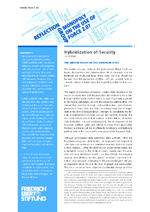Volker Böge
Think Piece No. 5: Hybridization of Security
Summary
- Governance is hybridized in many post-colonial countries. Hybrid political orders are characterized by diverse and competing authority structures, sets of rules, and logics of order. They combine elements of Western models with elements stemming from local indigenous traditions and are also affected by the forces of globalization and associated societal fragmentation.
- Hybrid political orders differ considerably from the Western model state and the way it operates, not least in the core domain of security. Internal security and order are not based on a state monopoly on the legitimate use of physical force. Under conditions of hybrid security governance, there is a huge variety of peace, security, and justice providers. They straddle the state/non-state boundary and maintain complex, fluid, and constantly changing intense interactions and relationships.
- We have to take this hybridization of security into account and have to explore ways of working with hybridity that could contribute to stable security and sustainable peace – if necessary beyond the state monopoly onthe use of force.
Latest Issues
- Mely Caballero-Anthony, Frieden und Sicherheit | Publikation
Think Piece 22: Security in Times of Uncertainty in Asia
Asias security outlook still appears to be laden with uncertainties. From the changing dynamics in the balance of power, an emboldened North Korea and…
- Ann L. Phillips, Frieden und Sicherheit | Publikation
Think Piece 21: Providing Security in Times of Uncertainty
The final report, distills the findings of a two-year effort by more than 20 international experts to find answers on how to overcome rising…
- Jaïr van der Lijn, Publikation
Think Piece 20: The future of the monopoly on the legitimate use of force - Four alternative global futures
The paper presents four alternative global futures for the monopoly on the legitimate use of force that aim to allow policy makers to embrace…
